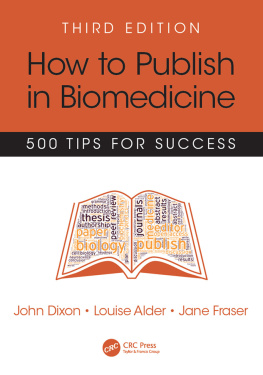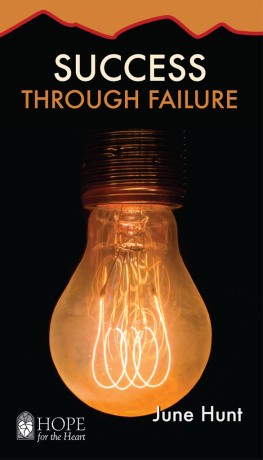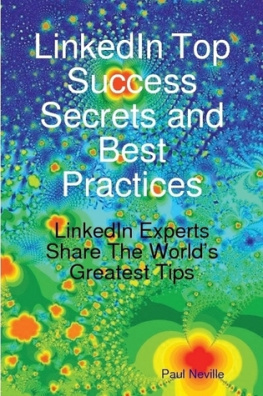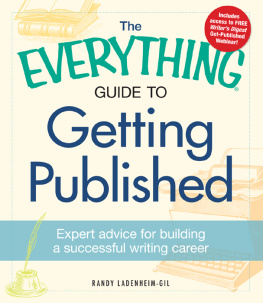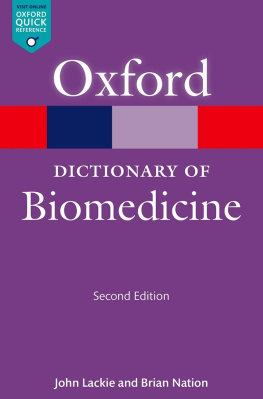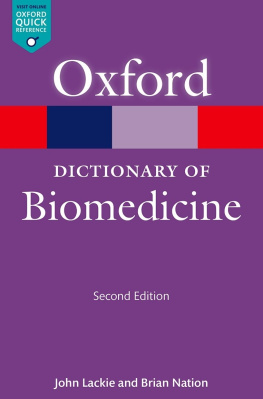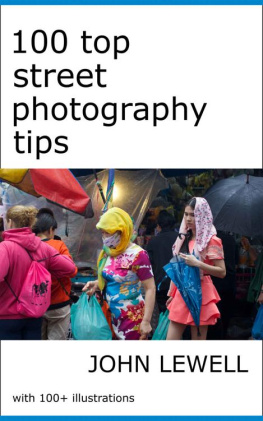Contents

How to Publish in Biomedicine
500 TIPS FOR SUCCESS
THIRD EDITION
How to Publish in Biomedicine
500 TIPS FOR SUCCESS
THIRD EDITION
John Dixon
Consultant in Healthcare Communications and Trainer in Scientific Writing, United Kingdom
Louise Alder
Trainer and Medical Communications Consultant, able mc Ltd., United Kingdom
Jane Fraser
Medical and Bioscience Communications Consultant and Skills Trainer, United Kingdom

CRC Press
Taylor & Francis Group
6000 Broken Sound Parkway NW, Suite 300
Boca Raton, FL 33487-2742
2017 by John Dixon, Louise Alder and Jane Fraser
CRC Press is an imprint of Taylor & Francis Group, an Informa business
No claim to original U.S. Government works
Printed on acid-free paper
Version Date: 20160719
International Standard Book Number-13: 978-1-78523-010-3 (Paperback)
This book contains information obtained from authentic and highly regarded sources. While all reasonable efforts have been made to publish reliable data and information, neither the author[s] nor the publisher can accept any legal responsibility or liability for any errors or omissions that may be made. The publishers wish to make clear that any views or opinions expressed in this book by individual editors, authors or contributors are personal to them and do not necessarily reflect the views/opinions of the publishers. The information or guidance contained in this book is intended for use by medical, scientific or health-care professionals and is provided strictly as a supplement to the medical or other professionals own judgement, their knowledge of the patients medical history, relevant manufacturers instructions and the appropriate best practice guidelines. Because of the rapid advances in medical science, any information or advice on dosages, procedures or diagnoses should be independently verified. The reader is strongly urged to consult the relevant national drug formulary and the drug companies and device or material manufacturers printed instructions, and their websites, before administering or utilizing any of the drugs, devices or materials mentioned in this book. This book does not indicate whether a particular treatment is appropriate or suitable for a particular individual. Ultimately it is the sole responsibility of the medical professional to make his or her own professional judgements, so as to advise and treat patients appropriately. The authors and publishers have also attempted to trace the copyright holders of all material reproduced in this publication and apologize to copyright holders if permission to publish in this form has not been obtained. If any copyright material has not been acknowledged please write and let us know so we may rectify in any future reprint.
Except as permitted under U.S. Copyright Law, no part of this book may be reprinted, reproduced, transmitted, or utilized in any form by any electronic, mechanical, or other means, now known or hereafter invented, including photocopying, microfilming, and recording, or in any information storage or retrieval system, without written permission from the publishers.
For permission to photocopy or use material electronically from this work, please access www.copyright.com (http://www.copyright.com/) or contact the Copyright Clearance Center, Inc. (CCC), 222 Rosewood Drive, Danvers, MA 01923, 978-750-8400. CCC is a not-for-profit organization that provides licenses and registration for a variety of users. For organizations that have been granted a photocopy license by the CCC, a separate system of payment has been arranged.
Trademark Notice: Product or corporate names may be trademarks or registered trademarks, and are used only for identification and explanation without intent to infringe.
Visit the Taylor & Francis Web site at
http://www.taylorandfrancis.com
and the CRC Press Web site at
http://www.crcpress.com
Contents
The Authors Revenge
There was an old editor (your foe),
Who usually preferred to say no,
He ranted and railed,
Till his heart nearly failed,
He died lonely and broken ho, ho!
Anon, 1823
Such is the miserable life of a journal editor.
First things first. Read this book. It is all true. Beautifully written. Brilliantly argued. You would be a fool to ignore the wise words it has to offer.
If, however, you are pressed for time (and unless you are working at a London teaching hospital, you will be), here is a summary. Structured, of course. The three As to acceptance are:
Approach. The covering letter is vital. Editors are showered with manuscripts daily (25 at The Lancet). We cannot possibly read through every page of every paper. Nor would we want to. A brief, gently hyperbolic account of what you have done and why it should be irresistible to the editor is a sure way to get noticed. But
Appeal. I am assuming rejection (which, be honest, is the likely outcome). The editors decision is never final. Editors are jitteringly insecure about their judgements. No one wants to pass up the scientific equivalent of an actors role in Jurassic Park. If your paper has not been peer-reviewed, claim tragic injustice and a terrible missed opportunity. If a reviewers pen has led to editorial refusal, claim undisclosed bias and a poverty of intellect on the part of the advisor. In other words, appeal to the editors better nature namely, greed for a higher impact factor.
Attitude. Be quick in your rebuttal of the editors decision. We have short memories. No recollection of your paper means no chance. And, in all your correspondence, be polite. I have a growing pile of incredibly irate letters from well-known professors of medicine, all of whom are too used to people saying yes to them. Here is the latest on my desk: Although I have not argued the toss with the last three rejections from The Lancet of papers in which I have been involved, I think this decision is extremely unfair and certainly I find it very difficult to accept based on the rather meagre contents of your letter. I am becoming increasingly confused about your editorial policy. I really cannot accept a rejection (etc., etc.). You can imagine that these sort of wails generate billowing gasps of laughter at The Lancet and consign the feted professors paper to unrecoverable obscurity. Charm, by contrast, works wonders.
Writing is hard, it is true. But when writing is done with others, it can be rewarding perhaps even pleasurable. Is this not a worthy end in itself, irrespective of the capricious editor?
In all of this publishing palaver, authors should remind themselves that, contrary to their expectations, editors like to be liked. We want to publish your work. So, put your pen down, put your feet up, pour yourself a large vodka, and read on. Even this Foreword was rejected first time around.
Richard Horton
July 1997
John Dixon MA FRCS MRCGP MBA
John qualified in medicine having studied at the University of Oxford and Guys Hospital Medical School, London. Initially he trained as a surgeon, gaining experience in accident and emergency medicine, orthopaedic, thoracic, general and ENT surgery, and became a Fellow of the Royal College of Surgeons of England (otolaryngology) and Edinburgh (general surgery). He then became a GP and Member of the Royal College of General Practitioners, having had experience in paediatrics, neonatology, and obstetrics and gynaecology. Since 2003, John has completed an MBA at Warwick University Business School whilst working as a Primary Care Trust project manager. He then spent five years as Director of Medical Communications in a UK medical communications agency, becoming a freelance consultant in healthcare communications in 2013. Throughout his career John has enjoyed teaching and being taught, and the peer-reviewed academic literature has been central to his work. His consulting and training interests include supporting scientific writers to ensure their communications are accurate, understandable and use appropriate language. He provides training in scientific writing and presentation skills for academics from a diversity of scientific disciplines in universities and research institutes across Europe

